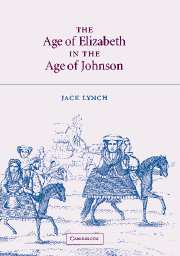Book contents
- Frontmatter
- Contents
- Preface
- Note on the texts and citation
- List of abbreviations
- Introduction
- 1 Struggling to emerge from barbarity: historiography and the idea of the classic
- 2 Learning's triumph: historicism and the spirit of the age
- 3 Call Britannia's glories back to view: Tudor history and Hanoverian historians
- 4 The rage of Reformation: religious controversy and political stability
- 5 The ground-work of stile: language and national identity
- 6 Studied barbarity: Jonson, Spenser, and the idea of progress
- 7 The last age: Renaissance lost
- Notes
- Bibliography
- Index
Introduction
Published online by Cambridge University Press: 22 September 2009
- Frontmatter
- Contents
- Preface
- Note on the texts and citation
- List of abbreviations
- Introduction
- 1 Struggling to emerge from barbarity: historiography and the idea of the classic
- 2 Learning's triumph: historicism and the spirit of the age
- 3 Call Britannia's glories back to view: Tudor history and Hanoverian historians
- 4 The rage of Reformation: religious controversy and political stability
- 5 The ground-work of stile: language and national identity
- 6 Studied barbarity: Jonson, Spenser, and the idea of progress
- 7 The last age: Renaissance lost
- Notes
- Bibliography
- Index
Summary
“Eighteenth-century historians,” writes Karen O'Brien, “had no word for ‘Renaissance,’ and this concept did not form part of their schemes of historical periodisation.” She has a point: the word “Renaissance” first appeared in English around 1840. It is therefore only natural that Herder, Burckhardt, Pater, Hegel, and Marx should figure larger than Johnson, Warton, Gray, Gibbon, and Hume in studies of the origins of the idea of the Renaissance.
But while the eighteenth century did without some useful critical vocabulary, the lack of the term did not altogether prevent the age of Johnson from recognizing the phenomenon. Granted, the late fourteenth through the early seventeenth centuries were not christened until the nineteenth. Still, eighteenth-century critics gave serious thought to the predecessors whom their successors were to name. Their ideas can tell us much, not only about the Renaissance but about eighteenth-century Britain as well: historiography was a part of its intellectual character. The age of Johnson often defined itself in relation to the age of Elizabeth.
THE SENSE OF RELATION
History never comes pre-sliced, and eighteenth-century Britons were given no tidily wrapped Renaissance to discuss: they had to invent it first. Historians make the past comprehensible by dividing the undifferentiated continuum of real-world events into discrete periods, against which that multitude of events can be understood. As Benedetto Croce put it nearly a century ago, “To think history is certainly to divide it into periods.” Marshall Brown makes the same point more grudgingly: “Periods are entities we love to hate.
- Type
- Chapter
- Information
- The Age of Elizabeth in the Age of Johnson , pp. 1 - 17Publisher: Cambridge University PressPrint publication year: 2002

